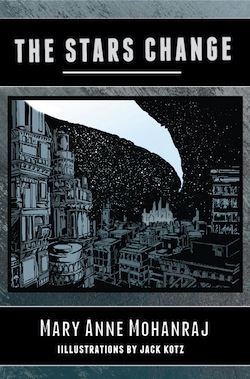Another book that’s the result of a successful Kickstarter campaign—I seem to be talking about a lot of those recently, don’t I?—Mary Anne Mohanraj’s The Stars Change is an illustrated short SF novel set on a colonized planet where humans, genetically modified humans, and aliens interact in the universe’s own university. The unique thing about this book, however, is that its plot builds through a series of encounters with characters and their intimate, sexual lives; though that plot is one of interspecies galactic conflict, the preludes to war, and other “large scale” issues, it is resolved through a tapestry of the individual, personal interactions of people.
This patchwork story, shifting between a large cast of characters in the predominantly Indian human community as well as various aliens from across many worlds, is an interesting take on the cultural, personal, and social relevance of the erotic: how something so simple as sexuality webs together various people and communities. In this sense, the actual “plot” is more a framework for exploring the characters and their lives.
This uniquely intimate focus is also what I very much enjoyed about the book. Mohanraj takes us through a series of erotic and personal encounters, weaving together a larger-than-its-individual-parts story from those. And the characters are as varied in that sense as one might hope: there are straight couples, young and old couples, groups, gender of various and sundry types, queers, arranged marriages as well as affairs, single people, and all of the small and large loves you might think possible between those combinations. (The particular focus on showing older people as sensual and erotically charged is something that stood out to me as a positive and rare representation, by the way—we don’t see enough older characters, particularly in SF, given intimate personal lives.)
The rich sense of culture and how sexuality (and ideas about it) vary throughout different cultures is also a strong point of the book. The brief scenes with aliens—such as the butterfly-esque man who decides that, as he can’t go back to his family to allow them to consume his body for sustenance, he will commit suicide by flying in the storm—broaden the spectrum of possibility in terms of erotic and personal connection as well. The three-gender group that Narita takes in after the initial bombing of the Warren, too, are given a culturally different sense of family and sex than the humans they interact with.
The primary conflict of the main protagonists—Amara and Narita—is also variously cultural: Amara’s initial abandonment of her lover before the story begins is based in a series of fears about how her family would react. Some of the struggles of queer women are explored through this couple—issues of self-naming, of being out or not, and of family expectations. The sense of community and family that the various characters have is another richly developed point of detail: everyone’s is a little different, shaped by their own experience and social mores. I appreciated that, for example, the initial “cheating husband” portrayal of Rajiv is complicated in the end: he’s done wrong, but because he’s unhappy, and he’s going to attempt to do right by his partners in the future.
It’s an interesting way to tell a story that’s actually more “action sci-fi” than anything else. The missile plot and the cobbled-together community of people who are trying to stop it exist alongside the community of people woven together by intimacy. This seems to be the point of the novel: that all of the people involved in these situations are individuals and are connected in deeply personal ways.
This is both the book’s strength and its weakness, interestingly enough. I, for instance, became far more invested in the interpersonal struggles than the interplanetary ones. For example, the attempt to stop the terror-attack plot by one cop and a group of civilians that makes up the climactic arc is engaging enough—but having spent so much time on an intimate level with the characters and how the specter of war affects their lives in the early part of the book, I actually found the shift to direct action less gripping.
There are also times when the balance between the story’s intimate focus and the larger plot come unbalanced—moments when the effort to show the character’s personal, sensual lives seems misplaced though they are clearly a part of the book’s project and the scenes themselves are interesting enough. In particular, the use of flashbacks or cutaways during otherwise high-paced action-and-conflict scenes sometimes works but sometimes doesn’t. This is the general danger of experimental ways to tell stories, though: that sometimes the experiment doesn’t quite come together.
All the same, it’s an experiment I’m glad to have read. As a whole, it was a quick and pleasant book. Despite the cost paid by many of the characters in the end to save their alien neighbors, the overall tone is of a feel-god text: a book that explores complex variations of pleasure and intimacy, of family and culture, in the divided-but-interwoven world of its characters; a book that wants to see people as good, show them as good, complicated though they may be in their interactions with each other—and how they may sometimes cause hurt. I liked it, and I thought the illustrations were a creative additional touch. It’s perhaps not entirely successful in its action plot, but I don’t think that’s always the important part of reading books. Sometimes it’s what the book is trying to do that matters more.
The ebook of The Stars Change has been released to backers; the print release date is early November from Circlet Press.
Lee Mandelo is a writer, critic, and editor whose primary fields of interest are speculative fiction and queer literature, especially when the two coincide. She can be found on Twitter or her website.










